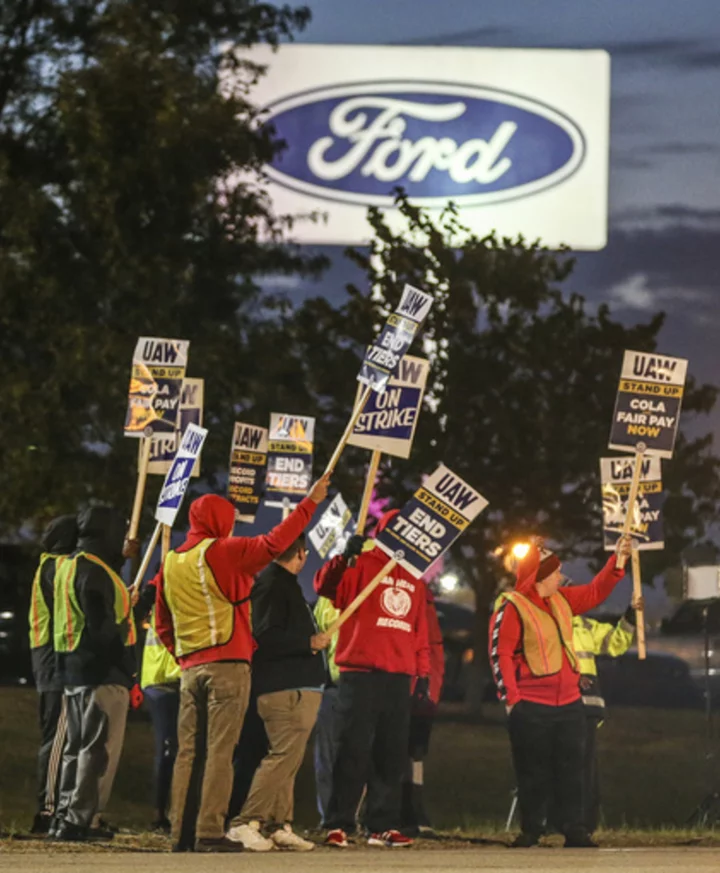DETROIT (AP) — The United Auto Workers union significantly escalated its walkout against Detroit's Three automakers, shutting down Ford's largest factory and threatening Jeep maker Stellantis.
In a surprise move Wednesday night, 8,700 members left their jobs at Ford’s Kentucky truck plant in Louisville.
And Thursday morning, union President Shawn Fain hinted at further action against Stellantis. “Here's to hoping talks at Stellantis today are more productive than Ford yesterday,” Fain wrote on X, formerly Twitter, without saying what might happen.
Ford's truck plant makes heavy-duty F-Series pickup trucks and large Ford and Lincoln SUVs, the company's most lucrative products. The vehicles made at the plant generate $25 billion per year in revenue, the company said in a statement.
Fain said in a statement that the union has waited long enough “but Ford hasn’t gotten the message” to bargain for a fair contract. “If they can’t understand that after four weeks, the 8,700 workers shutting down this extremely profitable plant will help them understand it,” Fain said.
The strike came nearly four weeks after the union began its walkouts against General Motors, Ford and Stellantis on Sept. 15, with one assembly plant from each company.
The company, however, called the strike expansion “grossly irresponsible” and said it has made strong wage and benefit offers to the union. It said the move puts about a dozen other Ford facilities at risk, as well as parts supply plants that together employ over 100,000 people.
Anthony Spencer, who has worked at the truck plant for eight years, said the surprise walkout would get Ford's attention. “We know it’s going to hit them. We lose a lot of millions of dollars every day that we don’t run,” said Spencer, who is the local union's recording secretary and helped organize the walkout.
“This is a historic moment," Spencer said on the picket line Thursday morning, adding that the local hasn't been on strike since 1976. “We’ve got people that’s got 30, 35, 40 years — they’ve never been on strike. So the morale is good.”
He said there were a few sticking points with negotiations that prompted the strike, including the unionization of Ford’s electric vehicle workers and employee raises.
“We all know if we ever go EV, we’re going to lose a lot of members that build engines, transmissions, and they got to have a place to go,” Spencer said.
A Ford executive said the union called a meeting at the company's Dearborn, Michigan, headquarters Wednesday afternoon where Fain asked if the company had another offer.
High-ranking Ford executives responded that they are working on possibly bringing electric vehicle battery plants into the UAW national contract, essentially making them unionized. But they didn't have a significantly different economic offer, the executive said. Fain was told the company put a strong offer on the table, but there wasn't a lot of room to increase it and keep it affordable for the business, the executive said.
Fain responded by saying, if that's the company's best offer, “You just lost Kentucky Truck Plant,” said the executive. The meeting only lasted about 15 minutes, he said.
In a video, Fain said the union moved because Ford didn't change its offer. “We've been very patient working with the company on this,” he said. “They have not met expectations, they're not even coming to the table on it.”
Marick Masters, a business professor at Wayne State University who follows labor issues, said the union is turning up the pressure on Ford. But the automakers have made concessions, raised wage offers and “may have reached their resistance points to varying degrees.” Executives, he said, have bottom line positions they can’t cross in terms of staying competitive with other automakers.
The union’s move doesn’t leave him optimistic for a quick end to the strikes, Masters said. “I think the issues that remain on the table are quite thorny,” he said, pointing to union demands that all workers get defined benefit pensions and health insurance when they retire.
The UAW expanded its strikes on Sept. 22, adding 38 GM and Stellantis parts warehouses. Assembly plants from Ford and GM were added the week after that. The Kentucky strike brings to 33,700 the number of workers on strike against the three automakers.
Thus far, the union has decided to target a small number of plants from each company rather than have all 146,000 UAW members at the automakers go on strike at the same time.
Last week, the union reported progress in the talks and decided not to add any more plants. This came after GM agreed to bring joint-venture electric vehicle battery factories into the national master contract, almost assuring that the plants will be unionized.
Battery plants are a major point of contention in the negotiations. The UAW wants those plants to be unionized to assure jobs and top wages for workers who will be displaced by the industry’s ongoing transition to electric vehicles.
Since the start of the strike, the three Detroit automakers have laid off roughly 4,800 workers at factories that are not among the plants that have been hit by the UAW strikes.
Striking workers are receiving $500 a week from the union’s strike pay fund. In some states, laid-off workers could qualify for state unemployment aid, which, depending on a variety of circumstances, could be less or more than $500 a week.
Separate companies that manufacture parts for the automakers are likely to have laid off workers but might not report them publicly, said Patrick Anderson, CEO of the Anderson Economic Group in Lansing, Michigan.
A survey of parts supply companies by a trade association called MEMA Original Equipment Suppliers found that 30% of members have laid off workers and that more than 60% expect to start layoffs in mid-October.
____
Associated Press Writer Dylan Lovan contributed from Louisville, Kentucky.









